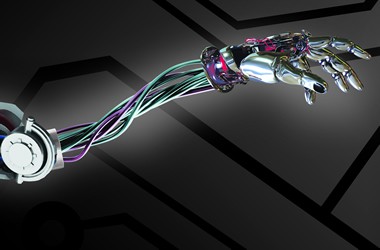Call for participation: HRI 2015 Workshop on Human-Robot Teaming
http://www.collaborativerobotics.net/hri15/
March 2, 2015, Portland, Oregon, USA
Held in conjunction with the 10th ACM/IEEE International Conference on
Human-Robot Interaction (HRI) 2015
=====================================================
Developing collaborative robots that can productively and safely operate
out of isolation in uninstrumented, human-populated environments is an
important goal for the field of robotics. The development of such
agents, those that handle the dynamics of human environments and the
complexities of interpreting human interaction, is a strong focus within
Human-Robot Interaction and involves underlying research questions
deeply relevant to the broader robotics community.
"Human-Robot Teaming" is a full-day workshop bringing together
peer-reviewed technical and position paper contributions spanning a
multitude of topics within the domain of human-robot teaming. This
workshop seeks to bring together researchers from a wide array of
human-robot interaction research topics with the focus of enabling
humans and robots to better work together towards common goals. The
morning session will be devoted to gaining insight from invited speakers
and contributed papers, while the afternoon session will heavily
emphasize participant interaction via poster presentations, breakout
sessions, and an expert panel discussion.
For more information, please visit
http://www.collaborativerobotics.net/hri15/
=====================================================
Topics of interest:
- Task planning under uncertainty
- Empirical methods for evaluation within human-robot teamwork
- Motion planning in multi-agent or dynamic environments
- Collaborator action and preference modeling
- Interpreting social signals for intention recognition, including
verbal and non-verbal communication
- Sliding autonomy, enabling robots to enhance capabilities of human
interaction partners
- Leveraging human-robot interaction to request assistance or to recover
from failure
- Understanding, modeling, and shaping team dynamics in mixed
human-robot teams
- Ethical concerns in human-robot teaming and decision making
====================================================
Speakers:
- Elizabeth Croft, University of British Columbia
- Ross A. Knepper, Cornell University
- Bilge Mutlu, University of Wisconsin-Madison
====================================================
Submission details:
We will accept contributed papers as either extended abstracts/short
papers (2-4 pages), industry white papers (2 pages), position papers (up
to 8 pages), or technical papers (up to 8 pages). Each paper will be
assigned two reviewers that will evaluate the submission based on
significance, technical quality, and relevance. Contributors are
encouraged to also provide supplementary video material alongside their
written submission that will be made available alongside the proceedings
on the workshop website. Details are available on the workshop’s
website:http://www.collaborativerobotics.net/hri15/.
=====================================================
Important dates:
26 Jan 2015 – Paper submission deadline
12 Feb 2015 – Notification of Acceptance
02 Mar 2015 – Workshop (Portland, OR)
=====================================================
Organizing Committee:
Bradley Hayes, Yale University, USA
Matthew Gombolay, Massachusetts Institute of Technology, USA
Malte Jung, Cornell University, USA
Koen Hindriks, Delft University of Technology, the Netherlands
Joachim de Greeff, Delft University of Technology, the Netherlands
Ivana Kruijff-Korbayova, German Research Center for Artificial
Intelligence (DFKI), Germany
Jeffrey M. Bradshaw, Florida Institute for Human and Machine Cognition
(IHMC), Pensacola, FL USA
Catholijn Jonker, Delft University of Technology, Delft, the Netherlands
Mark Neerincx, Delft University of Technology and TNO, the Netherlands
Maarten Sierhuis, Nissan Research Center Silicon Valley, USA
Matthew Johnson, Florida Institute for Human and Machine Cognition
(IHMC), Pensacola, FL USA
Julie Shah, Massachusetts Institute of Technology, USA
Brian Scassellati, Yale University, USA





